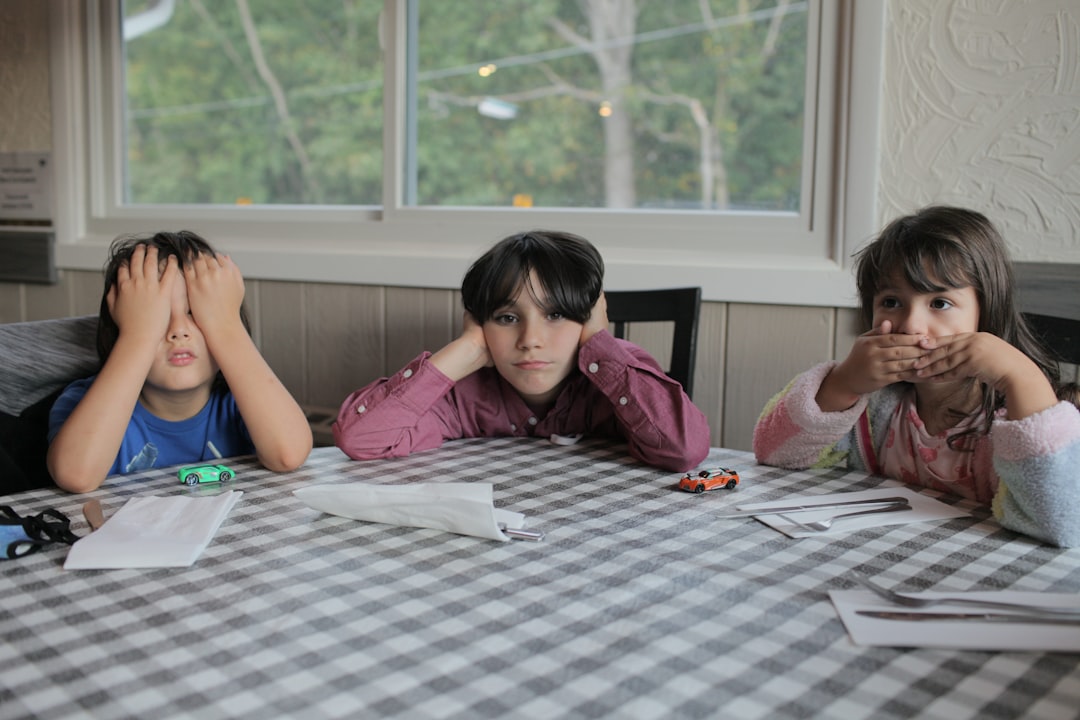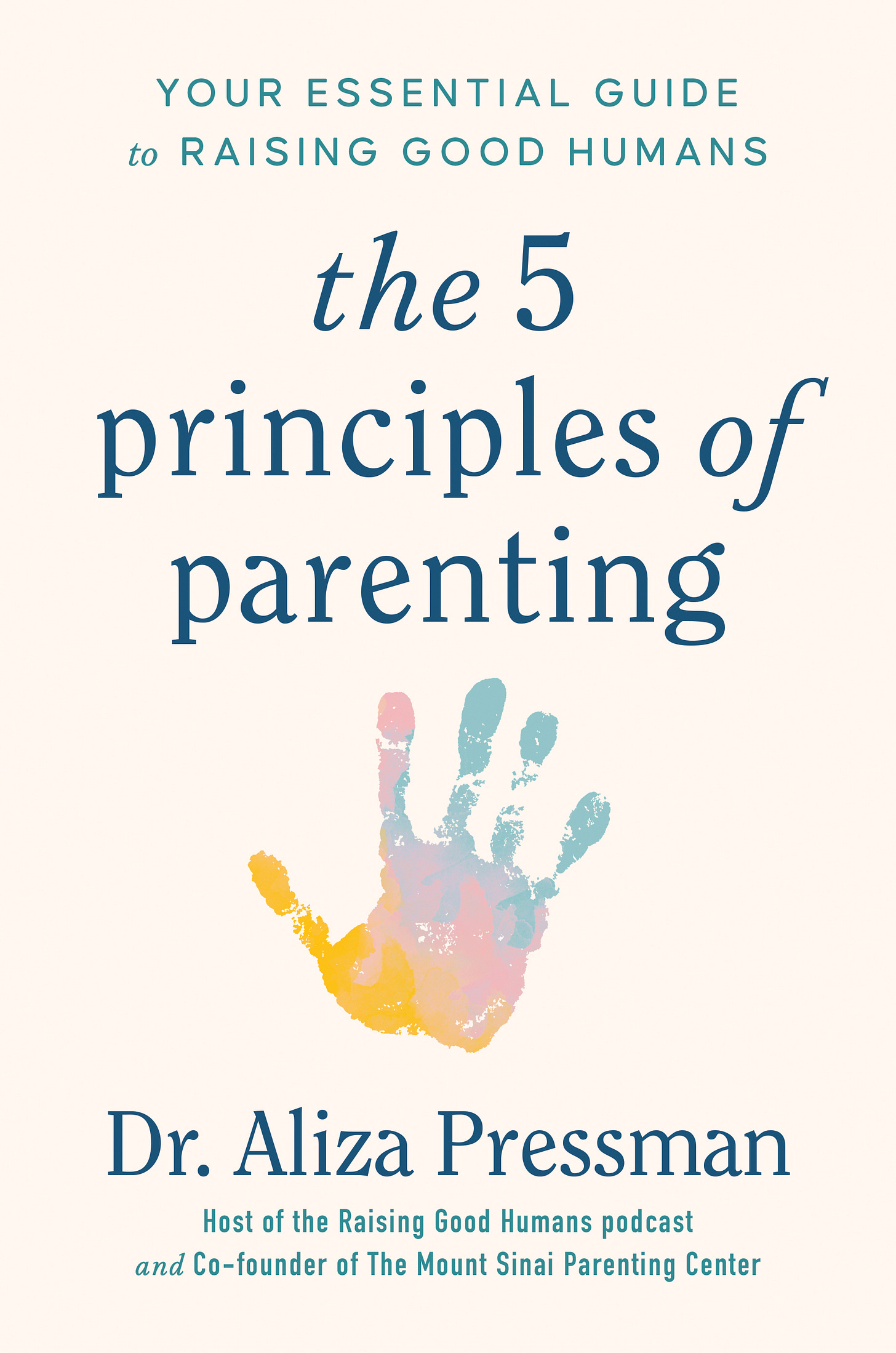Thanks for reading Raising Good Humans on Substack! My first book, The Five Principles of Parenting: Your Essential Guide to Raising Good Humans is now available for preorder here. All pre-orders will allow for access to exclusive LIVE events and will be eligible for exclusive bonus content this Fall. I am SO GRATEFUL for you and SO excited to get this book out into the world!

I’ve done many episodes on discipline (plus a special subscriber series dedicated to it!) and it's the topic that garners the most attention with the most downloads and questions. And I get it.
In this week’s episode with friend and colleague Dr. Tina Payne Bryson, we get into all things discipline from toddlers to teens. For more, a reminder to pre-order my first book, The Five Principles of Parenting! Not only will the book cover even more helpful content and ways to translate the science into everyday challenges, but when you pre-order you get special benefits - including a virtual seminar, and custom content specifically made for you. AND when you pre-order, you are helping me SO MUCH. Every single person who pre-orders the book, helps book sellers and shops to see that demand is high and convince them to stock The Five Principles of Parenting on their shelves. I need your help to make sure that happens, and so I promise special benefits to make it worth taking the lap to pre-order today.
Okay, back to discipline! Below are 5 key truths that research and practice support around discipline. My hope is that we can stay focused, stay grounded in our mission to lovingly support our children to grow skills while also feeling confident in our own limits and boundaries.
Here are some of the key points from our conversation:
Key Truth #1: Emotional responsiveness is not permissive parenting.
I have written about parenting styles before, but I am going to continue to clarify that having a sensitive, loving and validating response to your child’s emotions does NOT mean that you do not have limits, boundaries and expectations on and about their behavior. We can help our children to feel heard by giving them language, space, and comfort in their emotions, and still refuse to indulge their desire. For example, we can say, “I know you’re disappointed you can’t watch more TV. I get it and I know it is hard to turn it off. But it isn’t healthy for your sleep and I am not changing my mind.” From toddlers to teens, we can help our children to know that we see them, that their reactions make sense, that we feel the same way sometimes too, but still that we must hold the line in order to support them.
Let's revise the saying, "You get what you get and you don't get upset" to say "You get what you get and you might get upset, but you're still going to get what you get and I am here for you." Dr. Aliza Pressman
Key Truth #2: As humans, there is really no such thing as total self-soothing.
Coregulation is an essential part of how humans help each other to be soothed. We are biologically wired to seek comfort and connection from others when we are in distress, searching for those who can feel our pain, make us laugh, help us to feel loved. We regulate with each other, with the help of others, at all ages. This is the same as a baby reaching out for a hug, or a toddler needing their parent during a tantrum. Even adults, hopefully able to soothe themselves in many ways, seek a friend to share their worries with, or the comfort of a partner's hand in difficult times. This explains why our children need us in order to calm down, and cannot do it on their own when they are dysregulated. Ignoring them completely or dismissing their emotions gives them no way to connect, to find a lifeline to help them to regulate and find calm, or a model for how to calm themselves in the future. By soothing our children, we help their brains to learn how to be soothed, and the skills to be able to do it again for themselves as they age.
“As mammals, we are designed biologically to seek connection. When we're in distress, when our nervous systems experience a threat in some way, and we have a big emotional or physiological response, our nervous system says, ‘go to an attachment figure who will help you survive this.’” Dr. Tina Payne Bryson
Key Truth #3: Discipline is about teaching, not punishment.
When we can hold true to the meaning of the word discipline, we remember that it is about teaching, about helping our children to learn skills to manage their behavior in the world. Discipline is a critical part of a parent’s role as a teacher, as an aid in helping our children to understand the world and our expectations. Whether you call them limits, rules or boundaries in your home, we all have a philosophy on discipline, and on the ways in which we manage our child’s challenging behaviors. Yet many of us are missing those key conversations around how we intend to discipline our children, or how our partners may differ in their approaches. We spend most of the time reacting to our children’s behavior, allowing their behavior to guide our parenting instead of the other way around. Instead, if we can focus on the skills we want our children to gain - like impulse control, decision making, critical thinking, empathy and perspective taking - we can consciously work to help our children grow and thrive through hard moments.
In every discipline moment, we're always thinking about teaching. "What's happening here? What skill do I need? What is my child trying to communicate?" Dr. Tina Payne Bryson
Key Truth #4: We don’t have to punish to make a point.
The meaning of the word “discipline” is to teach, but the feeling of the word “discipline” is to punish. Punishment is satisfying to a parent’s brain. Of course it is! Even when we are bought into the idea that discipline is about teaching, when our children misbehave it feels absolutely necessary to make sure they understand the consequences. That is because we worry (constantly) about the message it will send them if they do not feel the pain of their own mistakes. This makes sense to the adult brain, capable of learning from missteps and making connections between their behavior and the eventual outcome, but very little sense to our children. Instead of learning from punishment, they learn from practice, from flexing those muscles in a new way, and from building skills to help them manage the next time.
“Many parents think, ‘I need to make sure that I'm not a pushover and that my child remembers that this is unacceptable, and therefore I have to punish them’ but we have so much research that says otherwise.” Dr. Aliza Pressman
Key Truth #5: We can let our kids do more of the work around discipline.
Starting in toddlerhood, our children can help us in teaching them the lessons around discipline that they need. Pausing and reflecting with them after the incident, we can call on them to help us understand what happened, why, and how they can do differently in the future. For example, “I know you know it is not OK to hit. Tell me what was happening for you. How did that feel in your body? What could you do instead?” Asking our children to use their own powers of critical thinking and reflection not only helps them to do much of the heavy lifting around discipline (including coming up with ways to make amends or take appropriate next steps), but it also works the very skills in their brains that we are trying to build.
“Asking our children to participate in getting clear on what happened, getting clear on what they can do differently next time, and getting clear on how to make the repair, are key in helping them use that prefrontal cortex, learn, and be accountable for their behavior.” Dr. Tina Payne Bryson
For more practical tips on managing challenging behaviors in your home, check out this piece!
Pre-order my book here!




